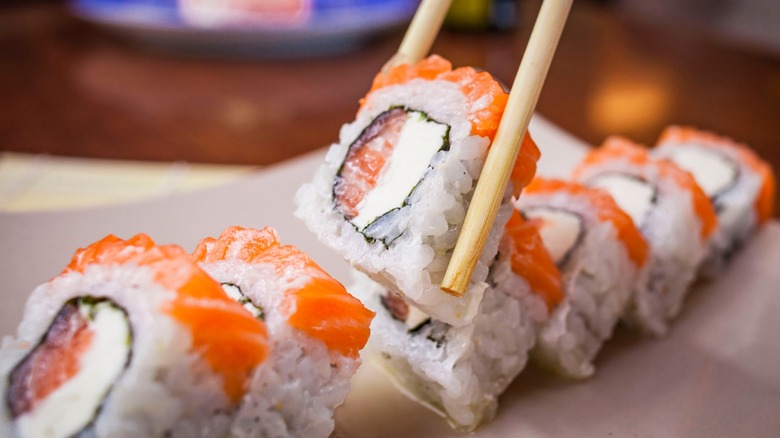Catch A Whiff Of This Sushi Restaurant Red Flag And You Should Walk Out The Door
Going out for a sushi dinner isn't like stopping by any old seafood restaurant — it is a one-of-a-kind foodie experience. Vibrant bites of expertly rolled maki and temaki grace the plates being taken to fellow customers while you peruse the menu, inspiring you to take a closer look to find out which tempting roll just passed by. Yet, if you catch a whiff of something fishy whilst those plates are being carried across the floor, that is one of the telltale red flags at a sushi restaurant suggesting you might want to walk out before placing an order.
Part of the appeal of a quality sushi joint is the elegant freshness of every dish. Chef and owner of Isekai Sushi and Cafe, Christopher Stout, is no stranger to quality sushi, and he told us that the aroma inside the restaurant should be reminiscent of the sea. "The smell should be similar to a clean ocean scent," Stout said. "If it smells overly 'fishy,' that's a bad sign."
Although raw and cooked fish are being served to nearly every customer in the restaurant, the overwhelming scent of it is a sign that it is beginning to spoil. That could be due to poor storage practices or mishandling of the seafood, but either way, it's not something you will enjoy putting in your mouth. It could even make you sick.
Off smells at sushi restaurants can spell disaster
We spoke with another seafood expert, the executive sushi chef at KAIYO SF, Kenji Sawada, about red flags to be aware of. He revealed that a fishy smell isn't the only aroma to be on the lookout for. He said, "I think sushi restaurants that smell like vinegar aren't clean enough." A slight hint of vinegar isn't anything to worry about — after all, in Japanese, sushi translates to "vinegared rice" or "sour rice." Yet, if the scent is overwhelming, it could be a sign that employees aren't engaging in best practices when tidying up after service.
Any off-putting stench that suggests the place isn't being disinfected properly — like strong bleach odors, chemical scents, garbage, or mustiness — is more than just something to keep in mind for a Yelp review. Proper cleaning is paramount, as it ensures bacteria haven't been allowed to proliferate. If a sushi restaurant smells unclean in any way (or like strong chemicals or deodorizers are masking something unpleasant), there is an increased likelihood that eating that gorgeous roll could result in a bad time later.
Consuming bacteria on fish, such as listeria, salmonella, and vibrio, can cause unpleasant experiences like abdominal cramps, diarrhea, fever, and chills. Even worse, some seafood used in sushi rolls, like salmon and haddock, may contain parasites such as anisakiasis that can make their way into your intestinal lining and require a doctor's visit. As excited as you might be to try that new sushi restaurant, if your nose detects a fishy, vinegary, or otherwise offensive aroma, you should get dinner somewhere else.

